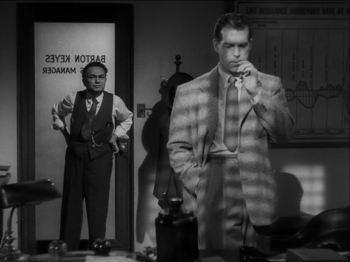 Writing is usually a solitary endeavor as we primarily sit alone at our keyboards, sometimes late at night, and peck away at our screenplays. It can get lonely because a writer must get away from the constant distractions of the day and escape alone into the world of characters on the page. If you’re thinking about working on a project with a writing partner and never had one before, you have to ask yourself if you both share the same work ethic and seriousness about the craft. Is this partnership for one project or are you becoming a writing team? What happens if your project sells? Is your partner easy to work with in regards to changes and notes? Do you both have the same creative sensibilities? If you don’t sell anything right away, how long will you both give the partnership? If you do sell something, how will you split the money? All good questions to consider before you both sit down and type “FADE IN.”
Writing is usually a solitary endeavor as we primarily sit alone at our keyboards, sometimes late at night, and peck away at our screenplays. It can get lonely because a writer must get away from the constant distractions of the day and escape alone into the world of characters on the page. If you’re thinking about working on a project with a writing partner and never had one before, you have to ask yourself if you both share the same work ethic and seriousness about the craft. Is this partnership for one project or are you becoming a writing team? What happens if your project sells? Is your partner easy to work with in regards to changes and notes? Do you both have the same creative sensibilities? If you don’t sell anything right away, how long will you both give the partnership? If you do sell something, how will you split the money? All good questions to consider before you both sit down and type “FADE IN.”
If you decide to become a writing team, you both must share a bigger vision about where you both see yourselves as business partners. It’s a business relationship first and you both must agree on every decision because it now affects both of your careers. You’ll both either swim or sink together and during the rough times, you’ll need a partner who will do everything he or she can to save you both if you’re sinking.
My overall experience with having a writing partner was very positive, but I’ve heard stories where friendships have ended because egos and the business got in the way. I’ve had a handful of writing partners over the years and together we worked on spec TV pilots and features, but my last and longest writing partner worked with me for nearly eight years. We met working together as waiters in a restaurant — he was an actor with credits and I was a writer who had film school and a few feature specs under my belt. We shared the same comedic sensibilities, work ethic, and were both extremely serious about pursuing a career as screenwriters. We were blessed to have crossed paths when we did.
When he asked me to join a brand new sketch comedy troupe, I jumped at the opportunity and it gave me the chance to also become a live performer. It was our invaluable experiences together writing, performing and producing the live show and subsequent pilot that helped to solidify our business partnership. We also became closer friends as a result.
After our live show ran for many years, we co-wrote and co-produced an independently financed film and that experience brought our working relationship to an entirely new level. After that successful experience, we both decided that we wanted to focus on writing feature screenplays. We hooked a literary manager who then found us an agent at a mid-level agency and we were off to the races. During this period, I also sold a spec script of my own that went into production the following year. But now they sold us to Hollywood as a “writing team” and our handlers constantly sent out our specs and set up dozens of pitch meetings.
As a writing team, we laid the foundation for producers to get to know our work and consider us for writing assignments or rewrites. Our scripts were always high concept comedies that were heartfelt and uplifting. This was perfect as the producers we were meeting made those types of movies and wanted to read our scripts. Many times, these producers brought our scripts to the studio level for consideration and we always felt with every positive step forward we moved closer to our big shot. It always seemed like just one script away.
We knew each other so well that it was like having my other half with me in the pitch meetings. And trust me, I’ve pitched alone and when it goes badly, it’s nice to have your writing partner there to back you up and vice versa. We were mature enough to know our weaknesses and both allowed each other to use our creative strengths to help the overall project. We took all ego out of the creative relationship.
As a team, it felt like family and we were like brothers looking out for each other as family. We always seemed on the same page with regards to the bigger picture. He always had some vivid wild dream and would come to me and pitch it, we’d work it out, and it would become our next project. I’d instantly see it in my mind and we’d structure the story, pitch it to our manager, and then write it. We’d usually complete a spec in a month and take notes from our handlers and quickly execute those notes. They liked that we worked fast and were so productive.
After our live sketch show ended, as a writing team we co-wrote and co-produced a feature film, completed seven feature scripts, took dozens of pitch meetings, and co-wrote and did voices for a Showtime pilot. We had a good run. He eventually decided to leave the business and open three very successful restaurants. I soldiered on alone.
For me personally, I’m so thankful to have had a writing partner during those creative years and I know we had more output together than if I had worked alone. Remember that when managers and agents send you out, you will be a writing team and from then on it will be difficult for you to work on your own as well. If you become successful and hook a writing job together, they will want the writing team and no just you alone. At the time, I recall my manager not really wanting to push my solo projects, as I was part of a writing team now and that was her focus.
Before you decide to write a project with a partner, you have to ask yourself if you both share the same work ethic and bigger vision about where you both see yourselves as a creative team. It’s a business relationship first and together you will make important decisions that will affect both of your careers. If your writing partner is a friend and your business relationship goes sour, you could lose your friend and the project in the process. What if your partner decides to go another direction and quit the writing team because you aren’t selling anything? What if your partner hates to execute notes and doesn’t get along with producers? Be sure about the person you decide to include in your own career path. Also remember that any money you make will be split between you as well. That big $100,000 script sale really means $50,000 each minus agent, manager and lawyer. It’s half the work, but also half the money.
A writing partner needs to be the right fit for the long haul because the team’s every success and failure will affect both of your careers. Like any relationship, it’s a give and take, so you have to seriously weigh the pros and cons of having a writing partner or choosing to go it alone. Choose wisely my friends.
Here’s a classic example of writing partners not working out from ‘Billy Wilder: The Art of Screenwriting No. 1’. Interviewed by James Linville in The Paris Review, 1996.
INTERVIEWER
I understand your collaboration with Raymond Chandler was more difficult?
BILLY WILDER
Yes. Chandler had never been inside a studio. He was writing for one of the hard-boiled serial magazines, The Black Mask—the original pulp fiction—and he’d been stringing tennis rackets to make ends meet. Just before then, James M. Cain had written The Postman Always Rings Twice, and then a similar story, Double Indemnity, which was serialized in three or four installments in the late Liberty magazine.
Paramount bought Double Indemnity, and I was eager to work with Cain, but he was tied up working on a picture at Fox called Western Union. A producer-friend brought me some Chandler stories from The Black Mask. You could see the man had a wonderful eye. I remember two lines from those stories especially: ‘Nothing is emptier than an empty swimming pool.’ The other is when Marlowe goes to Pasadena in the middle of the summer and drops in on a very old man who is sitting in a greenhouse covered in three blankets. He says, ‘Out of his ears grew hair long enough to catch a moth.’ A great eye . . . but then you don’t know if that will work in pictures because the details in writing have to be photographable.
I said to Joe Sistrom, Let’s give him a try. Chandler came into the studio, and we gave him the Cain story Double Indemnity to read. He came back the next day: I read that story. It’s absolute shit! He hated Cain because of Cain’s big success with The Postman Always Rings Twice.
He said, Well, I’ll do it anyway. Give me a screenplay so I can familiarize myself with the format. This is Friday. Do you want it a week from Monday?
Holy shit, we said. We usually took five to six months on a script.
Don’t worry, he said. He had no idea that I was not only the director but was supposed to write it with him.
 |
| Double Indemnity (Directed by Billy Wilder) |
He came back in ten days with eighty pages of absolute bullshit. He had some good phrases of dialogue, but they must have given him a script written by someone who wanted to be a director. He’d put in directions for fade-ins, dissolves, all kinds of camera moves to show he’d grasped the technique.
I sat him down and explained we’d have to work together. We always met at nine o’clock, and would quit at about four-thirty. I had to explain a lot to him as we went along, but he was very helpful to me. What we were doing together had real electricity. He was a very, very good writer—but not of scripts.
One morning, I’m sitting there in the office, ten o’clock and no Chandler. Eleven o’clock. At eleven-thirty, I called Joe Sistrom, the producer of Double Indemnity, and asked, What happened to Chandler?
I was going to call you. I just got a letter from him in which he resigns.
Apparently he had resigned because, while we were sitting in the office with the sun shining through, I had asked him to close the curtains and I had not said please. He accused me of having as many as three martinis at lunch. Furthermore, he wrote that he found it very disconcerting that Mr. Wilder gets two, three, sometimes even four calls from obviously young girls.
Naturally. I would take a phone call, three or four minutes, to say, Let’s meet at that restaurant there, or, Let’s go for a drink here. He was about twenty years older than I was, and his wife was older than him, elderly. And I was on the phone with girls! Sex was rampant then, but I was just looking out for myself. Later, in a biography he said all sorts of nasty things about me—that I was a Nazi, that I was uncooperative and rude, and God knows what. Maybe the antagonism even helped. He was a peculiar guy, but I was very glad to have worked with him.
Follow me on Twitter, Periscope and Vine: @scriptcat
Did you just complete your latest screenplay and need in-depth consultation? Check out my services by clicking on the blue icon below for the link to my website and more information. You never get a second chance to make a first great impression with your screenplay. Make the time to get it right.
Subscribe to my YOUTUBE CHANNEL for weekly video tips.
Check out my on-demand webinar “A Screenwriter’s Checklist” now archived and available for streaming on my Pivotshare Website. Click on the icon below for the link to the site.




Ask yourself what your prospective partner will bring to the writing relationship. Is it truly fifty- fifty? Because its true, you both must work equally hard as you will split any remuneration right down the middle. It is also hard, as you say, to sell yourself as a half of a Simon & Garfunkle team. Make sure you are the Simon or you may end up having harder than usual screenwriting endeavors.